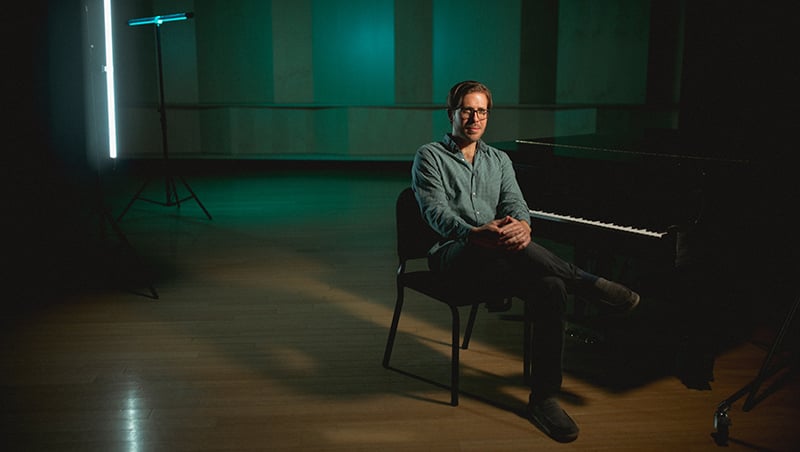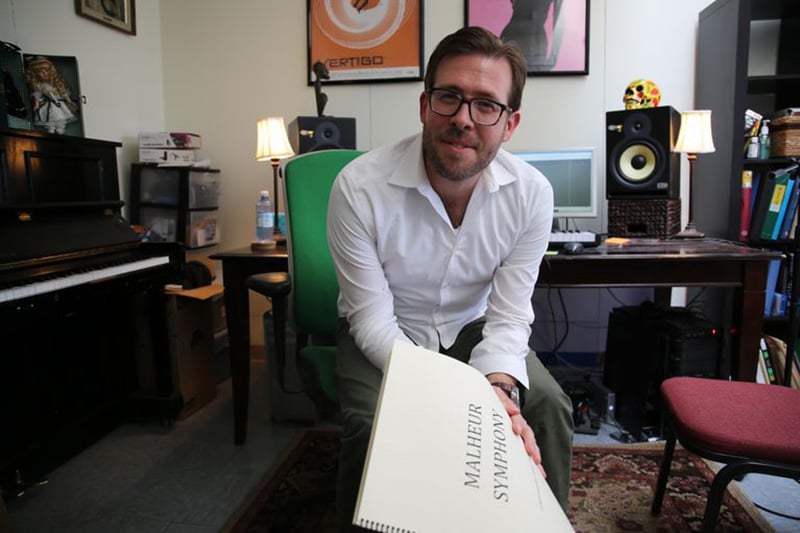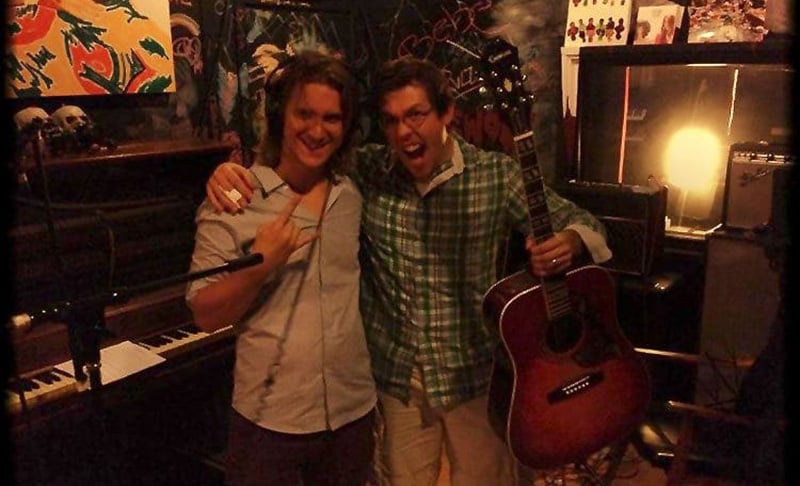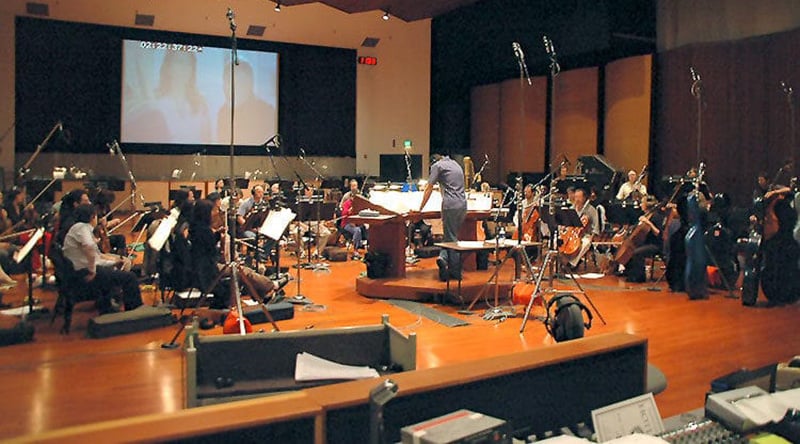
When you walk into an amusement park, what do you notice first? Is it the smell of grease wafting over from the food section? Or is it the anticipatory screams coming from the direction of the rollercoasters rising high over the locale?
Perhaps you find yourself drawn into the park’s surroundings through its music; that distinctly catchy rhythm intended to enhance the already exuberant atmosphere. But have you ever wondered about the behind-the-scenes composers who create it?
Meet Chris Thomas, BM ’06 (music composition), BA ’06 (political science), a 39-year-old self-described “weirdo” and jack-of-all-trades who has worked with some of the best in the business.
Thomas, a cellist by training but influenced by the likes of Beethoven—who he calls his first love—and composers such as Bernard Herrmann, Nino Rota, and Tōru Takemitsu, says he always knew that he was intellectually destined to be a composer. And growing up with a family of supportive musicians, he was taught to chase his dreams.
“I grew up with this attitude of ‘fuck it, why not? What is the worst that can happen?’” he says.

Chris Thomas in his home studio in Bend. Photo courtesy NPR.
It is an attitude that, overall, has served him well, landing him at the UO and later, the University of Southern California’s Thornton School of Music’s prestigious screen scoring program. But eventually, despite Thomas’s success, the worst did happen—and then completely by accident, theme parks became his salvation.
It was after the economic crash of 2008. Thomas was already established in the industry, but he was slowly watching his project prospects slip away as clients skipped town in search of more prosperous ventures.
“Everyone around me was going down and I thought ‘oh my god, this could be me,’ and then suddenly it was,” he says.
Feeling defeated, he took himself to the Los Angeles Haunted Hayride, an “insanely cool production,” which, according to Thomas, was completely derailed by an ill-fitting looping synth track.
“I thought, ‘how can you spend a million dollars on a show like this and just pull out the rug with one horrible little piece of music’,” he says.
So, he did what any well-meaning composer would: He phoned their hotline to voice his opinion and weeks later, got a call from the owner. At first, they were disgruntled, but soon they were meeting at Bob’s Big Boy, a classic Los Angeles diner, to discuss future plans.
“By the end of the luncheon, we had pretty much planned a score for their next show,” Thomas says. “We timed out everything and made sure the experience of the sound, the actors, pyrotechnics, and effects was integrated into it.”

Chris Thomas (right) recording theme music for the Los Angeles Haunted Hayride.
Since then, Thomas has gone on to produce music scores for Knott’s Berry Farm, Dreamland, and even Universal Studios, along with the projects he has done for cinema and television.
“(Theme parks) saved me from desperation,” he says.
Now Thomas splits his time between his home office in Bend and his studio in Los Angeles, where he works with a dedicated production team on some of the most well-regarded works in the business. He won the 2020 Hollywood Music in Media award for his work with Imagine Symphony Live and has been nominated for various other awards, including the Academy of Film & TV Music Award. He says he is also looking forward to future projects, like the upcoming MasterClass he will be teaching on film scoring. In other words, he keeps busy—especially during the summer, at the end of which Thomas says that projects are due in droves.
Thomas credits the UO and its “old school” music training that helped get him where he is today—although the UO was his last choice, at first.
“I will never forget what changed my mind,” the Pendleton-born composer says. “I got into a couple of my top-choice universities and I thought all I ever wanted was to do nothing else but play music . . . then I met with the head of the composition department and he said, ‘here we will allow you to study whatever you are curious about.’ And I thought ‘Oh shoot’ . . . I do not think I am ready to stop learning about the world.”
Learning about the world led to a discovery that he had a penchant for political science and a passion for physics and astronomy, fields that have helped him better conceptualize his music. And why not? Math and music are fundamentally linked.
“It just made me a more well-rounded and intuitive person . . . I was exposed to ideas and concepts and music and thinking from every part of the world and it was so humbling to compare my life to something bigger. Conceptually, my mind just expanded thousands of times greater than it would have if I had not taken those classes.”

Chris Thomas conducts an orchestra for a score at Warner Bros studios. Photo courtesy Dan Goldwasser.
Learning about the life cycle of stars, for example, helped Thomas look at the bigger picture and see he finite details that comprise it—a technique that he often applies to his own compositions. He says that he is constantly asking questions of his work or “throwing musical noodles at the wall until one of them sticks” to uncover the deeper meaning behind the plot of his projects.
“For me, I am a humble servant of the project I work on,” he says, “A filmmaker comes to me . . . and the question becomes ‘what does this project need’? I always tell people I am not so much a musician as a storyteller . . . It is all about how you unpack a narrative . . . if you are not uncovering something deep, then you are missing so much of what moves people . . . there are always little subtexts that are worth getting to the bottom of.”
Yet, in the grand scheme of things, composers do not always get much of the spotlight. But Thomas says that hard work pays off in the end—the goal is not to ‘be a rock star,’ but rather to make people feel things intuitively.
Still, next time you go to a theme park, consider the composers who bring it all to life. Would that ride really be the same without its jaunty jingle? It may not be as momentous as the birth of a star, but it does make a world of a difference. Take it all in.
For Thomas, that would be enough.
- Story by Sage Kiernan-Sherrow, student associate. Photos courtesy Chris Thomas unless otherwise noted.